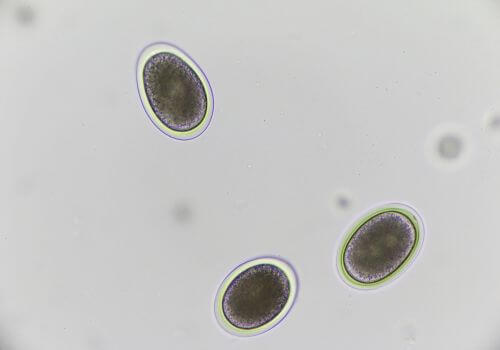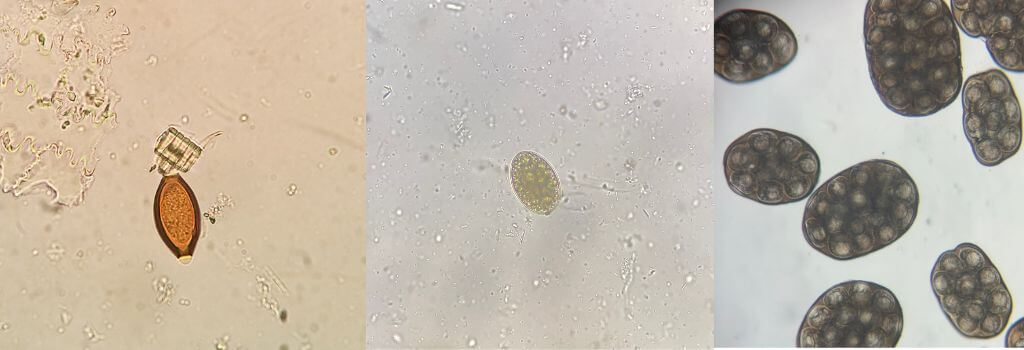As a pet owner, your beloved companion's health is of utmost importance. As such, it’s important to be aware of the risks associated with parasites in dogs. Early detection and diagnosis of these parasites are key to keeping your pup healthy and happy. At Peace of Mind Veterinary Care, we’re passionate about helping pet parents understand more about parasites and how to protect their furry friends.
Here, you’ll find answers to common questions such as how old your pup needs to be for parasite prevention, how to get rid of intestinal parasites, and how to diagnose parasites in your dog. We’ll also discuss external parasites, ringworm, and the importance of early detection.
We understand the importance of keeping your pup healthy and are here to help. Let’s dive into the world of dog parasites and find out the answers to all your questions. If you live in or near Burnsville, MN and need help with your pup’s parasite control needs, we’re here for you! Call (952) 435-7194 to schedule an appointment.

How Old Does My Dog Need to Be to Start Parasite Prevention?
Puppies can start parasite prevention as early as six to eight weeks old. It’s best to consult with your vet about the best preventive measures and products to suit your dog’s age and needs. Different parasites may be more common than others depending on where you live. Your vet will help determine which ones pose the biggest risk and the best time to start preventive measures.
What Are Intestinal Parasites and How Do I Get Rid of Them in My Dog?
Intestinal parasites are organisms that live inside a host animal’s gastrointestinal tract. Common examples include:
- Roundworms
- Whipworms
- Hookworms
- Tapeworms
- Giardia
- Coccidia
- Spirochetes
Dogs contract intestinal parasites through contact with contaminated soil, water, feces, or food. Some parasites are also transmitted from the mother to puppies during pregnancy or nursing.
Symptoms of intestinal parasites in dogs include:
- Poor growth in puppies
- Diarrhea
- Dark, tarry stools
- Anemia
- Irritability
- Failure to digest food or absorb nutrients
- Emaciation
- Variable appetite
- Poor coat condition
Veterinarians typically require a stool sample to diagnose intestinal parasites. Prompt treatment should be started when any intestinal parasites are detected. The type of treatment depends on the specific parasite.
To prevent intestinal parasites in dogs, practice good hygiene; clean up after your dog; avoid contact with contaminated soil, water or feces; visit your vet regularly for fecal exams; and use recommended preventive products as directed by your vet.

What Are External Parasites and What Can I Do to Prevent Them?
External parasites are organisms that infest the external body surfaces of pets, such as their skin and fur. Common external parasites in dogs include:
- Fleas
- Ticks
- Lice
- Mites
These parasites can cause discomfort and skin problems. They also transmit diseases.
Prevention methods include regular grooming; using preventive treatments like topical medications, oral medications (e.g., Bravecto, NexGard, Simparica) or flea and tick collars; maintaining a clean environment; checking your pet regularly for signs of parasites; and seeking veterinary care if you notice any signs of external parasites.
How Soon Should I Bring My Dog to the Veterinarian if I Suspect They May Have Parasites?
If you suspect your pup may have parasites, seeing your veterinarian as soon as possible is important. In the case of external parasites, contact your vet right away if you notice any signs on your dog. For internal parasites, collect a stool sample from your pup and take it to the vet for analysis. Regular fecal exams are important to catch infestations in their early stages.
How Will a Veterinarian Diagnose Parasites in My Dog?
Veterinarians rely on several methods to diagnose parasites in dogs. Fecal samples are the most effective way to detect intestinal parasites. The sample is mixed with a special liquid that causes parasite eggs to float, and these eggs can then be collected and observed under a microscope. Other techniques include sedimentation, Baermann technique, fecal culture, blood analysis and urine analysis. Typically, vets can diagnose external parasites by performing a physical examination.

Is Ringworm a Parasite?
No, ringworm is not a parasite. It is a common fungal infection that affects the skin, hair and nails of various species of domestic animals, including dogs and cats. Despite its name, ringworm is not caused by a worm or parasite; rather, it is caused by a group of fungi known as dermatophytes. In dogs, 70% of ringworm cases are caused by the fungus Microsporum canis.
Ringworm is highly contagious and requires intervention from a veterinarian. Symptoms include circular areas of hair loss, dry and brittle hair, scabby and inflamed skin, and rough, brittle claws. To prevent the spread of ringworm, you should wash your hands after handling pets, wear gloves and long sleeves when handling infected animals, and frequently clean and disinfect areas where your pet spends time.
Why Is Early Detection and Diagnosis of Parasites So Important?
Early detection and diagnosis are crucial for maintaining your canine companion’s overall health and well-being. Parasites can lead to a range of health problems in pets, including poor growth and development, anemia, weight loss, and damage to internal organs. In some cases, if left untreated, parasites can even cause death. In addition, certain parasites can be transmitted from animals to humans, posing risks to pet owners and their families.
Regular veterinary check-ups and early detection tests such as complete blood count (CBC), urinalysis, and blood chemistry tests help pet owners and veterinarians detect potential issues before they become serious problems. Regular testing also helps reduce the risk of transmission to humans.
By understanding the importance of early detection and diagnosis of parasites in pets, you can take proactive steps to ensure your pet’s health while minimizing risks to your family.
Conclusion
Parasites are a major source of discomfort and disease for dogs, and early detection and diagnosis are crucial for maintaining their health. While preventive measures such as good hygiene, regular veterinary check-ups, fecal exams, and preventive treatments help reduce the risk of parasites in dogs, you must also be aware of the signs of parasites so you can take action if needed.
At Peace of Mind Veterinary Care, we are committed to providing the highest quality care to pet owners and their furry companions. We offer comprehensive parasite prevention services and work with our clients to ensure their pets receive the best care. Contact us today at (952) 435-7194 to learn more about how we can help protect your pup from harmful parasites.
